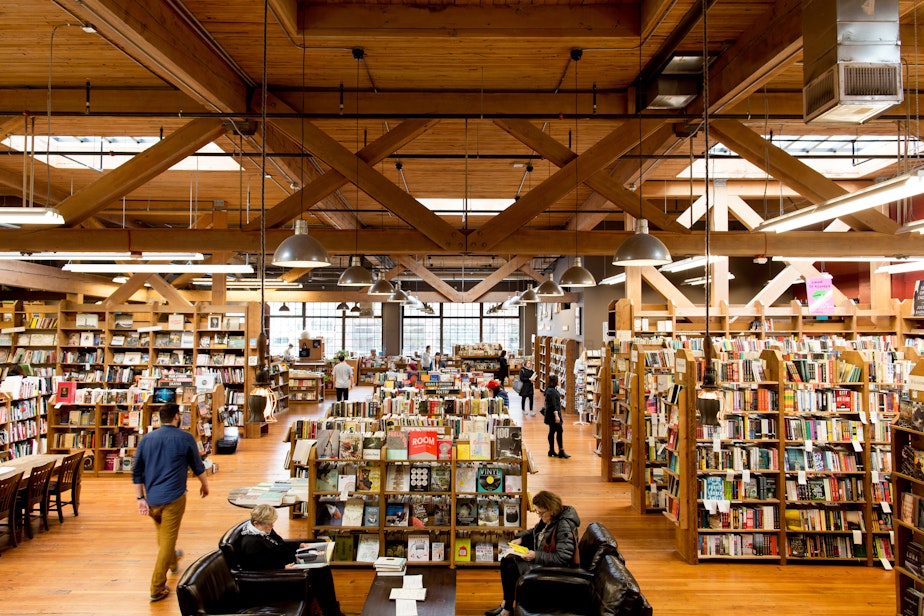'Waiting to dance again.' How Seattle's literary community weathered the pandemic

Seattle takes its poetry seriously — so much so that it has an official civic poet.
The role of the civic poet is to be an ambassador for the literary arts, fostering dialogue between communities, engaging people and connecting them with art, and, yes — writing poetry.
For the last three years, that role has also been to memorialize a number of unprecedented challenges.
For the past three years, that poet has been Jourdan Imani Keith. There was the Covid-19 pandemic, national outrage over the murder of George Floyd, and a turbulent election. Through all of it, Keith has charted those changes for Seattle.
Her term ended in August, but she’s continuing to work on commissioned projects for the city through the New Year. Soundside host Libby Denkmann spoke with Keith to get her reflections on her time as civic poet.
"I don't know what else is more important than to amplify how we're part of this civic fabric," Keith said.
In commissioned works titled "Essential" and "What We see in the Dark is Light," Keith brought a poet valor to the labor of essential workers and the heavy physical and emotional toll of the pandemic.
"The people, and the jobs that we may fail to recognize are actually the heartbeat," Keith said.
Sponsored
But the Civic Poet is just one feature of Seattle’s unique literary scene.
In 2017, Seattle was designated a UNESCO City of Literature, one of only two U.S. cities to hold the title. This designation celebrates Seattle’s abundance of writers, publishers, libraries, and bookstores, all of which define Seattle as not just a writerly city, but a readerly one too.
In September, Seattle hosted its first literary festival in 18 years, a full weekend of author panels and readings celebrating Seattle's literary status.
"Being a city of literature is kind of an ineffable thing," said Stesha Brandon, the program manager for Seattle City of Literature, a nonprofit maintaining Seattle's relationship with UNESCO. This United Nations agency promotes the international exchange of arts and culture.
Only two U.S. cities are recognized as international "cities of literature": Seattle and Iowa City. The relationship promotes the exchange of writers across the world and supports initiatives for writing that emphasize things like climate change.
Sponsored
"We are very lucky in terms of having a huge independent bookstore scene," Brandon said. "So many writers, you know, hundreds and hundreds and hundreds of writers here, across a lot of different writing disciplines."
Brandon said that pre-pandemic, there were upwards of 2,000 author-related events a year in Seattle. She also noted that Seattle has more independent bookstores per capita than any other major city in the country.
Independent bookstores are one of the avenues for Seattleites to engage with and support their literary community. Bookstores are retailers, community gathering spaces, and venues.
"[The pandemic] was a brutal hit, right away," said Robert Sindelar, managing partner for Third Place Books. "What became unique, for us at least and bookstores in general was that during the pandemic, across the country, we were surrounded by people who weren't going to work and weren't going to school, had a little extra time on their hands, and were also in independent businesses."
For writers, the pandemic showed how supportive Seattle can be as a city of literature. Writer and Seattle City of Literature board president Josh Fomon said the closing of venues and limited moments for connection showed how difficult being an artist in Seattle can be.
Sponsored
"It made it very apparent how thin some artists are in terms of being able to live here and sustain living here," Fomon said. "We've seen a lot of people leave because it's just not tenable to live here anymore."
Poet Amber Flame, who recently began performing poetry again at an event called Red Light Lit, echoed Fomon's concerns with affordability for artists.
"Making a living is one job, and being a poet is often another job," Flame said. "My advice is not so much advice as a question of, what is your priority? Is it important for you to be given space to really delve into your writing? Is it important to you to have stages to share it on, or is it important for you to have this sort of professional identity as a poet?"
Listen to Soundside's full story on the reawakening of Seattle's literary scene by clicking the play button above.





